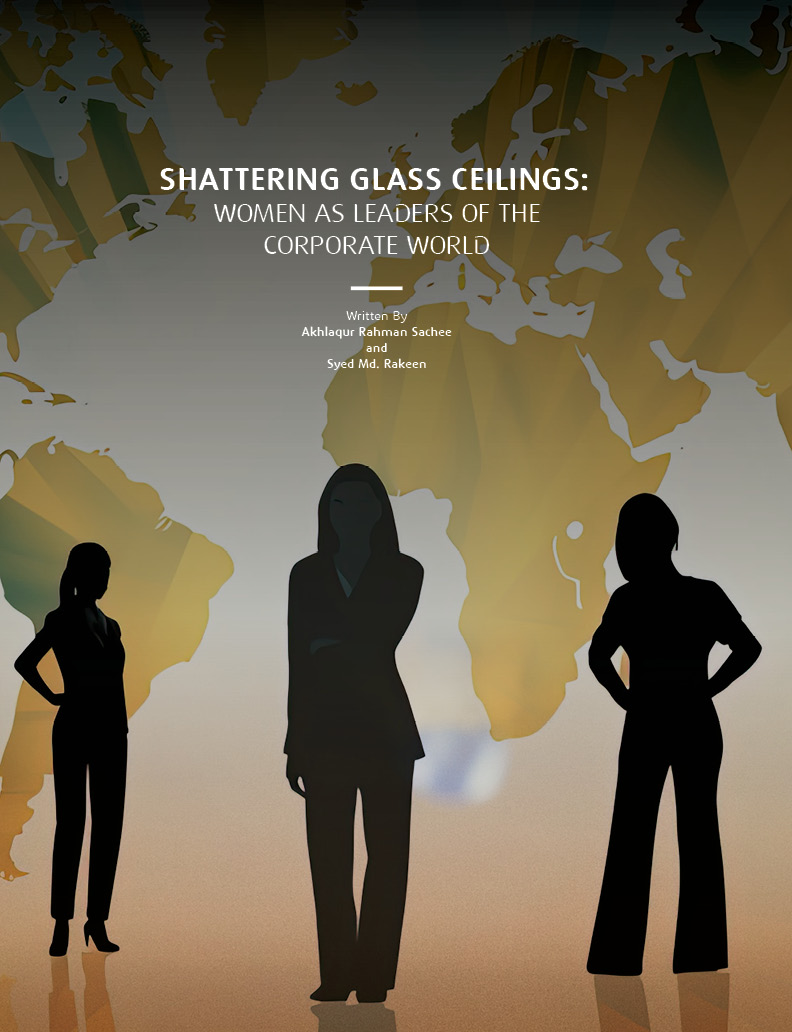
Shattering Glass Ceilings: Women as Leaders of the Corporate World
Written By Akhlaqur Rahman Sachee & Syed Md. Rakeen
The 8th of March embodies a special sentiment towards the lives of women who have powered through historical social oppression to reach the current state of women's empowerment. In the context of Bangladesh, for the last two decades, the country has progressed hugely in terms of improving the lives of women. According to the Global Gender Gap Index 2023, a report concentrated on the gender gap of 146 nations by the World Economic Forum, Bangladesh climbed 12 positions above, from 71st to 59th position in 2023 relative to 2022. This impressive growth can be largely attributed to the increased participation of women in education, politics, and the workplace. Globally, the proportion of women in corporate leadership roles has been continuously increasing, indicating a paradigm shift in favour of diversity and inclusivity. Women in Bangladesh, too, are progressively shattering glass ceilings to occupy key positions in corporates. In recent times, women have also broken several social stereotypes by initiating online businesses and startups in Bangladesh. Successful startups such as Shajgoj, Shohoz, Praava Health, ShareTrip, Arogga, etc., which were founded and led by women, are clear evidence of the phenomenal successes of women-led startups. Despite the promising scenario of women's empowerment in Bangladesh, the gender gap across various workplaces still continues to persist in the country, as the economic growth of the country has not coincided with an increase in women's empowerment.
Women in Education and Workplaces
Education serves as a crucial component for the advancement of gender equality as it equips women with the abilities, knowledge, and assurance to contribute to society as well as their workplaces. Bangladesh has taken gigantic strides towards achieving gender parity in tertiary education. As per a recent report by the University Grant Commission, Bangladesh is inching closer to reaching complete gender parity in terms of tertiary education. Currently, among the 4.4 million students in the country enrolled in public universities, 2.3 million (52%) are male, while the remaining 2.11 million (48%) are female.
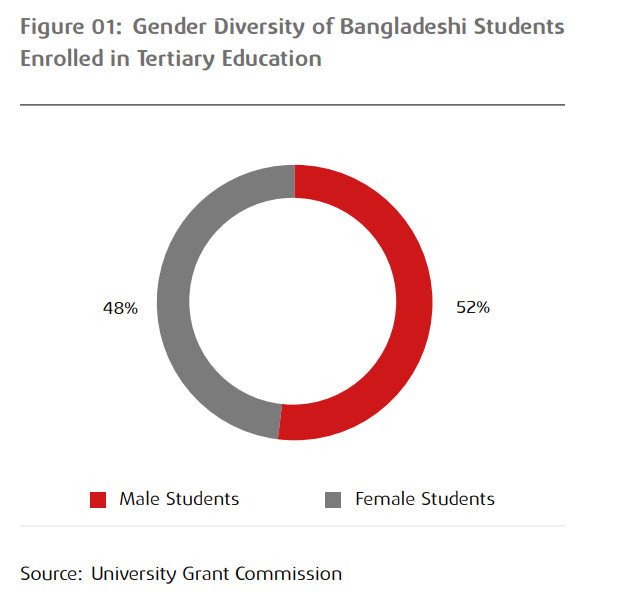
As per the Quarterly Labour Force Survey 2022 of the Bangladesh Bureau of Statistics, Bangladesh currently has 24.99 million women employed. Out of them, 4.31 million belong to urban areas, and 21.62 million belong to rural areas. Historically, social restrictions prevented women in Bangladesh from entering the job market, let alone assuming leadership roles. Their advancement was impeded by cultural norms, limited educational opportunities, and traditional gender roles. Recently, women have started to make notable progress in corporate leadership roles as a result of the progressive mindset of society and initiatives to promote gender equality.
The gender parity at tertiary-level education has translated to some multinational workplaces already, such as Unilever, which ended the year 2022 with 50% females at managerial levels, a stark contrast in comparison to 2016, when the figures were less than 10%. The gender balance ratio in this gigantic conglomerate ranks among the highest in all industries in Bangladesh.
As per a report by the Bangladesh Bank, 16.32% of the around 1.99 lakh employees working at 61 scheduled banks are female. The participation of women in foreign banks surpassed that of local banks by a large margin, with 24.11% of the employees being female in foreign banks, compared to 16.27% and 16.19% at private and state-owned banks, respectively.
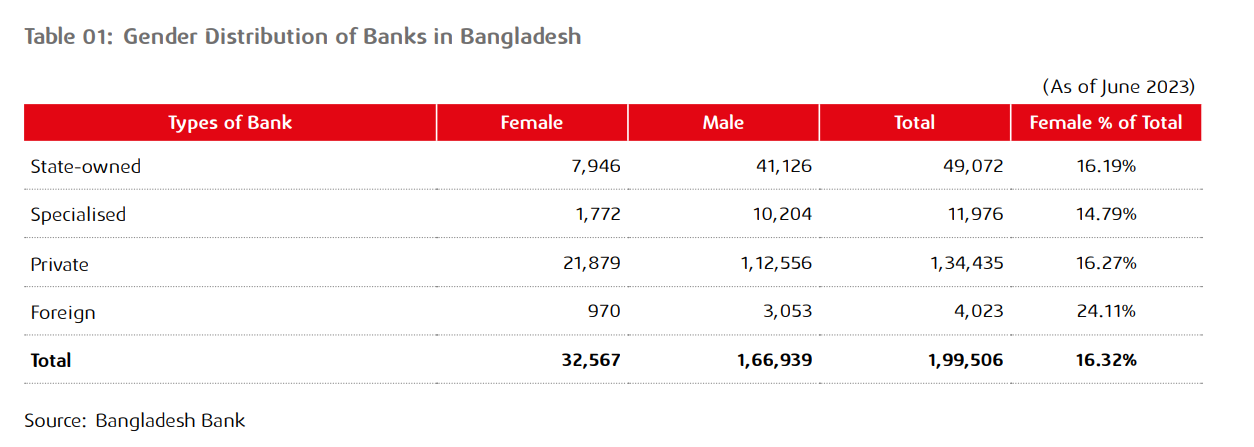
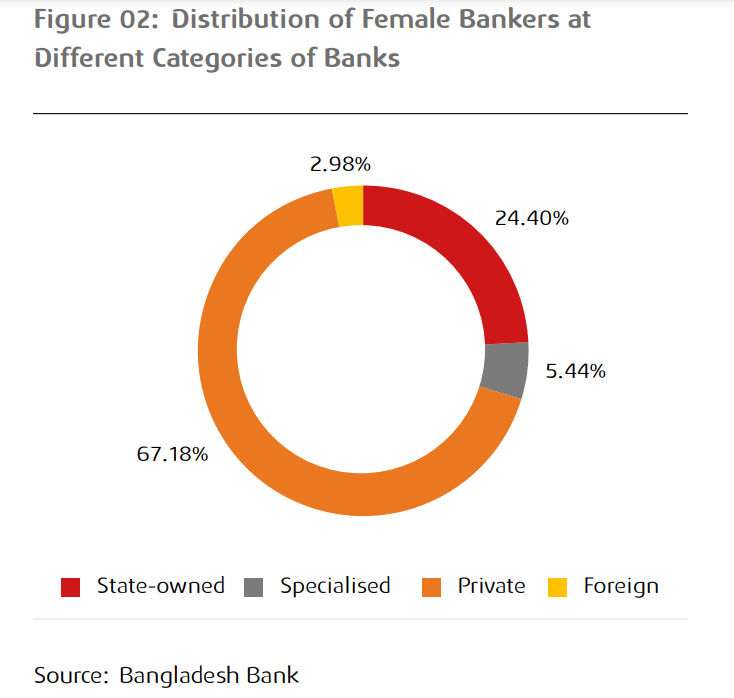
However, private banks have turned out to be the largest employers of female bankers, with 67.18% of the total female bankers working at private banks, followed by 24.40% at state-owned banks. Alongside, 15.80% of the employees of non-bank financial institutions are female. In terms of participation on boards, 14.05% of the board members of banks and 15.77% of the board members of non-bank financial institutions are female. To encourage the participation of women, all the banks and non-bank financial institutions offer maternity leave for six months. Also, all the banks and NBFIs have a ‘Sexual Harassment Prevention and Awareness Policy’.
Despite challenges, women have been able to assume leadership roles in multiple arenas. Humayra Azam has been appointed as the first female managing director and CEO of a commercial bank named Trust Bank. In the insurance industry, Farzanah Chowdhury has been appointed as the managing director and CEO of Green Delta Insurance Company. One of the most successful female corporate leaders, Rupali Chowdhury, has been leading Berger Paints Bangladesh in the role of CEO since 2008. A prominent corporate personality, Rubaba Dowla, is leading Oracle as the country managing director for Bangladesh, Nepal, and Bhutan. A renowned fashion designer and former international model, Bibi Russell, formed Bibi Productions, which represents Bangladesh on the global stage. An accomplished leader, Tamara Hasan Abed, is heading BRAC Enterprises as managing director. Bikroy.com, the largest marketplace in Bangladesh, has appointed Eshita Sharmin as CEO in 2022. Ayesha Aziz Khan has been leading Summit Power International as managing director and CEO since 2016. One of the biggest names in Bangladesh, Transcom, is being led by a female group CEO, Simeen Rahman. In the data and analytics industry, Zara Mahbub is serving as the CEO of Dun & Bradstreet Data & Analytics. In the readymade garment industry, Rubana Haq is the managing director of Mohammadi Group, and she was also elected as the first female president of the Bangladesh Garment Manufacturers and Exporters Association. Ananta Apparels is also being led by a female chairman, Qamrun Nahar Zahir, who has been leading the organisation for more than 25 years. One of the most prominent names in the beauty industry, Persona, was founded by Kaniz Almas Khan in 1990. The leading advertising agency, Adcomm, is also being led by a female chairman and managing director named Geeteara Safiya. Farah Kabir is leading an international non-governmental organisation named ActionAid Bangladesh as country director. In the venture capital industry, Sonia Bashir is the first female tech venture capitalist, and she is also the former managing director of Microsoft Bangladesh. All these women have been able to shatter glass ceilings and bring about tangible benefits for businesses and society at large.
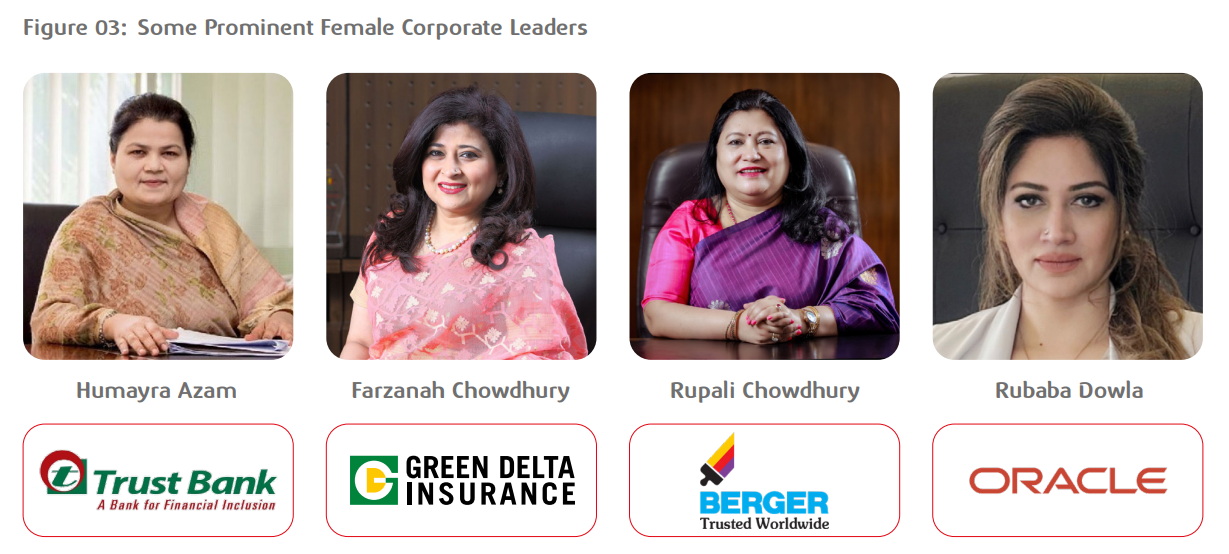
The local startup scene has experienced the rise of women as well. Sadia Haque of ShareTrip, Maliha M. Quadir of Shohoz, Sylvana Quader Sinha of Praava Health, Sinthia Sharmin Islam of Shajgoj, and Ivy Huq Russell of Maya are just some of the most known faces in the startup scene.
Underrepresentation of Women in Workplaces
Though there have been admirable advancements in gender equality in recent years, deeply ingrained discriminatory attitudes and behaviours still restrict women's access to opportunities and resources. This leads to restricted participation in decision-making, uneven access to employment and education, and a persistent gender wage disparity. According to the International Finance Corporation, only about 18% of the directors of the publicly listed companies in Bangladesh were women in 2022, indicating a severe dearth of women as leaders in Bangladesh. As per the Bangladesh Bureau of Statistics survey data published in March 2023, the female labour force participation rate stands at 42.68%, which is still significantly lower than men's 82.4%. In the banking sector, due to different socioeconomic realities, women's engagement is quite minimal. Female employees have to overcome complex obstacles while dedicating themselves to their professions. In addition, despite having a strong start to their careers in banking, a good number of female bankers leave in the mid-way. However, in the last five years, women’s unemployment has reduced to 0.94 million from 1.3 million, while the country’s total unemployed has reduced to 2.63 million from 2.7 million, according to the Bangladesh Bureau of Statistics.
Paving the Way for Women to Be Leaders
In order to make real change, deeply held assumptions should be confronted and should provide women with the tools they need to succeed as equal collaborators in Bangladesh's development. In order to address the ingrained norms, a concerted, society-wide strategy is needed. In order to bring about long-lasting change, a proactive approach needs to be taken that starts with educating the next generation in a gender-sensitive way to develop critical thinking skills and alter cultural beliefs. Furthermore, it is essential to interact with associations and grassroots organisations in order to foster progressive views about women's rights. Social media may be a powerful instrument for promoting women's rights, challenging prejudices and stereotypes, and amplifying the voices of women.
Ensuring equitable compensation and advancing women into leadership roles are essential. Men sharing duties can be encouraged while also relieving the burden of unpaid care on women through policy reforms and parental leave incentives. Appropriate funding must be secured in order to implement creative and inclusive policy solutions that address the varied demands of women. Additionally, men must play an active role as supporters in the struggle for gender equality, as women may struggle to accomplish all of these on their own.
Besides, emphasising the need to provide childcare services and establishing secure and encouraging work environments for women remain key to women's empowerment. The establishment of public-private programmes can play a vital role in helping women successfully manage their obligations to their families and their careers. In addition, the promotion of expanding women's access to advanced study in related fields in an attempt to boost the number of female employees in banks and other financial organisations remains crucial to unlocking the potential of women in workplaces.
Specialised Credit Lines to Promote Women Entrepreneurship
An example of financial support specifically for women entrepreneurs can be found in Bangladesh, where they benefit from the specialised services of the Women Entrepreneur Development Unit launched by the Bangladesh Bank. Dedicated desks for women entrepreneurs have been ensured at branches and head offices of all banks and non-bank financial institutions to offer customised services and easy access to loans. The Small Enterprises Refinance Scheme, managed by the Women Entrepreneur Development Unit, is designed to ensure the easy availability of cheap funds to promote women's participation in economic activities.
As part of its efforts to support women entrepreneurs, the central bank has introduced policy measures like financing targets and relaxed eligibility requirements for loans. The Small Enterprise Refinance Scheme has been expanded from BDT 1,500 crore to BDT 3,000 crore with the aim of benefiting women entrepreneurs all over the country.
In relation to the COVID-19 pandemic, the government provided financial support for the CMSME sector. The stimulus facility aimed to provide working capital facilities with a 4% interest rate, with a portion reserved for women entrepreneurs. The stimulus package was expected to support women entrepreneurs during this post-pandemic era.
The objectives behind these initiatives are to provide a conducive environment for women entrepreneurs so that they can gain financial power in their own rights and also help boost the overall development of Bangladesh.
A strong indicator of Bangladesh’s progress towards inclusive economic development and gender equality is the increase in the number of women leaders in Bangladesh. If the government, stakeholders, and civil society organisations continue to offer assistance, financial resources, capacity building, and networking opportunities, women leaders both in the corporate world and the CMSME sector in Bangladesh will prosper and will continue to steer the nation towards sustainable economic growth. The empowerment of women is a reflection of Bangladesh's commitment to fostering an atmosphere that values and maximises the potential of all of its citizens. With the help of their creativity, perseverance, and persistence, women are changing the commercial landscape, inspiring younger generations, and laying the foundation for a more prosperous and inclusive society.
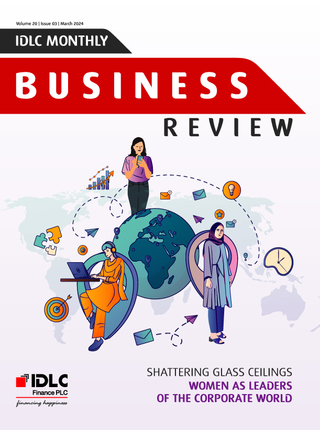
Shattering Glass Ceilings: Women as Leaders of the Corporate World
The corporate landscape of Bangladesh is undergoing a transformation as diversity and inclusion are gaining overdue recognition. Women leaders are making notable strides, challenging traditional gender roles, and securing top positions in renowned corporations. This paradigm shift signifies a crucial step towards a more equitable and progressive work environment where talent and meritocracy prevail over gender biases.
Bangladesh is inching closer to achieving parity in tertiary education, meaning women are no less capable of achieving success in competitive arenas. Translating this gender parity to workplaces is what is required to ensure women's empowerment. However, despite advancements, the gender gap in workplaces remains, with women still underrepresented in decision-making roles. Hence, it's imperative to capitalise on women's capabilities by creating a supportive work culture that harnesses their talents and expertise.
Empowering women has impacts beyond just the corporates. It drives positive economic growth and serves as a beacon of inspiration for future generations. By advocating gender equality and fostering inclusive workplaces, Bangladesh can pave the way for a more prosperous and equitable society where everyone has the opportunity to thrive and succeed.
Md. Shah Jalal
Editor
IDLC Monthly Business Review
Download View